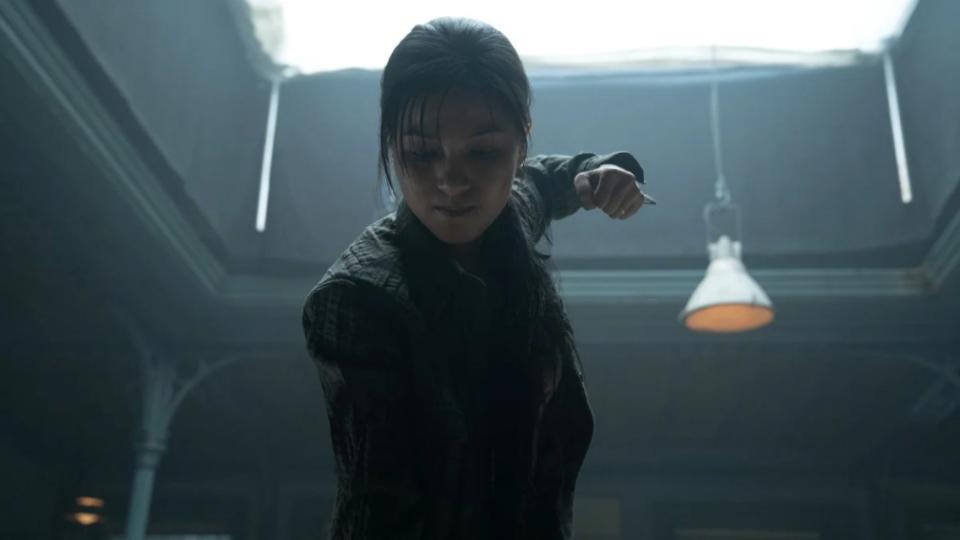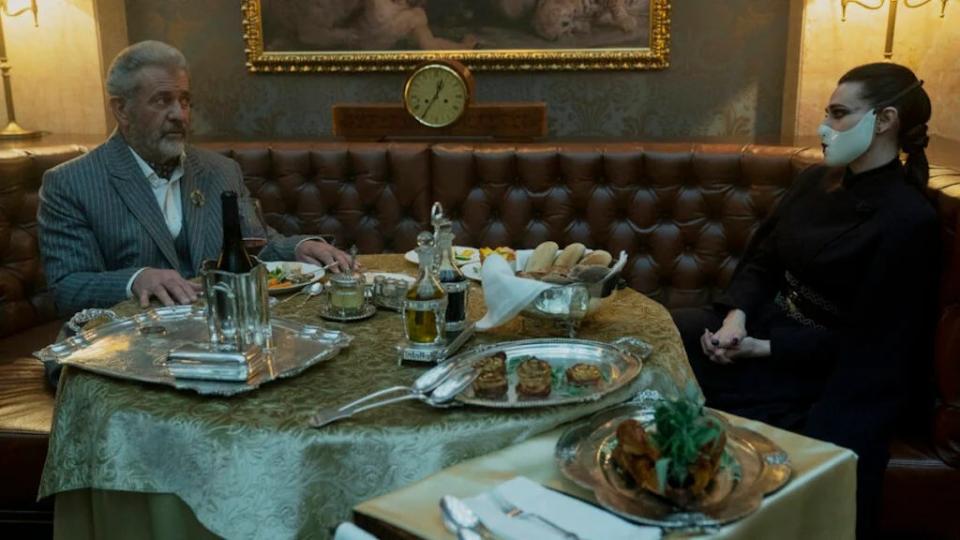‘The Continental’ Review: Adequate Action Doesn’t Keep Peacock’s ‘John Wick’ Spin-Off From Falling Flat
“The Continental” boasts that it’s “From the World of John Wick.” But the Peacock spin-off is thankfully uninterested in providing a microwaved version of the same story. Instead, the miniseries takes its cues from stylized crime auteurs, folks like Joe Carnahan or Guy Ritchie who have as much fun, if not more, with their eccentric character archetypes, rat-a-tat banter and bold needledrops as they do with any blood shed on screen.
But “The Continental” merely aspires to these authors of cinematic cool. And in its Icarus-esque reach, what it faintly grasps only reminds us how hard it is to make something look easy.
Over three sprawling, 90-minute episodes, “The Continental” is centered on a simple story, one that has roots as recent as “The Raid” and as far back as “Rio Bravo” – or more accurately, John Carpenter’s riffs on “Rio Bravo” like “Assault on Precinct 13” or “Escape From New York.”
Brothers Winston (Colin Woodell, playing the younger version of Ian McShane’s “John Wick” character) and Frankie (Ben Robson) were recruited into the scuzzy but alluring world of crime by fiendish King of New York, and chief proprietor of the Continental Hotel, Cormac (Mel Gibson), aided by the prim and proper Charon (Ayomide Adegun, playing the younger Lance Riddick character). But when Frankie gets his hands on a particularly juicy MacGuffin, Cormac is ready to betray his young proteges, siccing every eccentric assassin in the tristate area to stop them. So Winston recruits a motley crew of fighters and vagabonds, plans to break into the Continental, fight whoever’s in the way and eliminate Cormac by any means necessary.
Break in, kill the mini-bosses up the tower, kill the big boss at the top floor. Almost as alluringly simple as the original inciting incident in “John Wick” – they killed his dog, now he’s gonna kill them. But a lean feature film’s running time and pacing prove more of a fertile ground for this spartan of storytelling than a four hour and 30 minute miniseries. To fill the time, writers and creative partners Greg Coolidge, Kirk Ward and Shawn Simmons (who all developed the Amazon YA action-thriller series “Wayne”) stretch character decisions – and more frustratingly, ruminations – past the point of credulity.
You don’t have to watch a single “John Wick” film to know that these characters (or any character in any story) eventually have to say yes to the mission of ransacking the castle – otherwise, the plot won’t happen and there wouldn’t be a television show. Yet so much time, especially in “Night 2” (the three episodes are divided into “nights”), is spent watching Winston sell would-be allies on his plan, and watching these would-be allies hem and haw until the inevitable is reached and they mercifully agree. It’s the modern mindset of “a television show can just be a movie spread out” taken to its mindnumbingly absurd conclusions, like focusing football on the delay of game.
And when the ball is finally snapped, to keep their barebones plot “intriguing,” the creators resort to jarring character decisions based on hasty, unclear revelations. Newly introduced characters like hardboiled detective KD (Mishel Prada) or noble dojo owner Lou (Jessica Allain) seem to shed philosophies built over the miniseries at the drop of a gold coin, behaving aggressively out of character based on plot moves unearthed literal minutes before. It’s like riding a roller coaster with nothing but loop-de-loops, all whiplash with no care taken.
Some of the discursions found by the creative team are surprisingly potent, however – and earn their potency by playing essentially as self-contained pieces of theater (it’s almost as if the medium of television works at its best when you take advantage of its episodic nature). The aforementioned Lou, a Black woman, shares a complicated conversation (after a badass, cartop fight scene) with crime boss Orphan Master (Dan Li), a Chinese American immigrant. The two verbally spar about cultural appropriation, the shifting ownership of power in a globalizing New York, and the necessity of desperate measures in a desperate world. These are the kinds of thematic gestures a television show has room to make, and it’s a welcome scene for sore eyes, especially in a genre that rarely makes room for such slowly-paced examinations.

In another successful, but more personal, character-driven scene, Lou’s brother Miles (Hubert Point-Du Jour) shares a bilingual chat with Frankie’s wife Yen (Nhung Kate) while scouting on a mission. The two performers lock into each other, committing emotionally with effortless depth, elevating material that could play as mere trope or trauma porn into something honest and real. As the series moves on and these two get into the action shenanigans they need to get into, the lingering memories of this scene make us continue to care for them, an absolute magic trick given how we’ve just gotten to know them, and how little help other characters are given.
That’s especially, and unfortunately, true of our central hero and villain. Woodell, who turned in fiendishly ambiguous work on “The Flight Attendant,” is fundamentally miscast and misdirected as Winston, leaning much too far into the stylization of the material and coming off as a kid play-acting in dress-up clothes rather than evoking any kind of authenticity – let alone one in conversation with McShane’s take on the same role (the end of “Night 1,” in which Woodell performatively growls a line literally stolen from “The Matrix,” is particularly cringe-inducing).

Gibson waffles between scenery-chewing buffoonery and buttoned-up menace without consistency, allowing the hard angles of the scripts to thrash him rather than building any kind of throughline himself. It’s particularly hard to watch Gibson spout inane, punny, sub-Schwarzenegger one-liners amid his carnage. Not only are these moments wildly out of voice for the IP, but some of their off-color purviews remind us grimly of Gibson’s beyond-problematic past, making this reviewer wonder why anyone is still willing to work with the guy in the first place.
For those not checking into “The Continental” for any value in writing or performing, for those who just want a slambang good time – you’ve got some visual treasures to explore. It’s a treat to see action vet Albert Hughes (“Dead Presidents”) and prestige TV vet Charlotte Br?ndstr?m (“The Outsider”) direct these episodes with imagination and a kind of fluidly cartoonish style. While their choices sometimes require eye-cocking moments of CGI, it’s an uncommon joy to feel the fun behind the camera translate so devilishly. And the production design on this sucker, from Drew Boughton (“The Man in the High Castle,” another alternate history period piece), is consistently gorgeous, delivering a New York City that feels like “Taxi Driver” smushed with “Batman: The Animated Series” – call it “trash deco” and give me some more, please.
And the action sequences here, the raison d’être of the “John Wick” film franchise, are, like, totally fine! It’s clear many of the lead performers don’t have as much stunt experience, or time to train, as those in the film, resulting in some of their fight choreo being edited down to feel less intuitive, de-escalating into mere shootouts or simply consisting of limp-feeling punches. And some obvious shortcuts are taken to string together a version of “cinematic language” in these bouts, especially the camera’s predilection for pushing in onto a solid object or person’s clothes to wave away an obvious cut in a falsely constructed “oner.”
But when goons get blasted and tossed down a stairwell, or performers like contortionist Marina Mazepa get an uninterrupted chance to strut their stuff, it pops and provides lizard-brained pleasure in that special, juicy way only “John Wick” can – or, when it’s really cooking, provides said pleasure with an uncommonly rich foundation, thanks to welcome, but rare, time spent on the ensemble cast.
Ultimately, “The Continental” is often simmering, but only rarely cooking. Credit where credit’s due: the miniseries is genuinely interested in expanding the voice and world of “John Wick” rather than mere rehash. But for pity’s sake, it too often confuses effort with execution, confusion with intrigue, posturing with purity, the love of the game with a game well played.
“The Continental: From the World of John Wick” premieres Friday, Sept. 22, on Peacock.
The post ‘The Continental’ Review: Adequate Action Doesn’t Keep Peacock’s ‘John Wick’ Spin-Off From Falling Flat appeared first on TheWrap.
